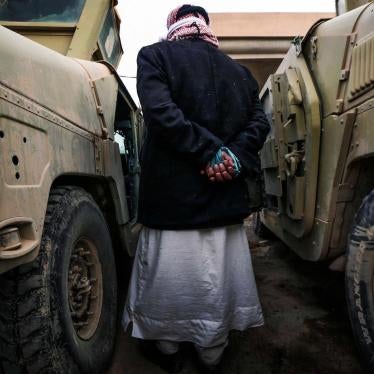(Washington) – Libya’s House of Representatives should urgently amend provisions of a counterterrorism law that could be used to curtail free speech and rights to peaceful assembly and movement. The law runs afoul of Libya’s obligations under international law and human rights treaties it has ratified.
The House of Representatives, the elected parliament of Libya’s internationally recognized government based in the eastern city of Tobruk, adopted the Law on Combatting Terrorism [3/2014], on September 14, 2014.
“Libyan authorities have legitimate concerns about the growing influence of extremist armed groups and the threat they pose to Libyans and foreign migrants alike,” said Sarah Leah Whitson, Middle East and North Africa director. “But legislators need to make sure that the law against terrorism can’t be used to suppress basic rights.”
On May 13, 2015, Libya will undergo its second Universal Periodic Review (UPR), an assessment of each member country’s rights record held every four years, before the Human Rights Council in Geneva. United Nations member states should use the review to press Libya to urgently amend the Law on Combatting Terrorism and other legal provisions that curtail fundamental freedoms.
Libya has been gripped by chaos and lawlessness since the outbreak of serious hostilities in mid-2014. Two rival governments are vying for legitimacy – an internationally recognized government based in the east, and a self-declared one based in the west.
Armed groups, including some that have pledged allegiance to the extremist group Islamic State (also known as ISIS), have become stronger as a result of the security vacuum and have committed numerous rights abuses. These include summary executions of foreign nationals, and public punishments that include extra-judicial executions, floggings, and amputation of limbs. Extremist armed groups have also claimed responsibility for large-scale attacks that killed civilians, such as one on Tripoli’s Corinthia Hotel.
Human Rights Watch sent a letter to the justice minister of Libya’s internationally recognized government on March 23, 2015, that detailed deficiencies in the counterterrorism law and recommended specific changes to address these and bring the law into conformity with Libya’s international treaty obligations. During a meeting on April 14, the deputy justice minister told Human Rights Watch that she had submitted the letter to the House of Representatives for review.
The main concerns include:
-
Harsh punishments of up to life in prison for vaguely defined acts “that harm national unity,” without the involvement of violence. Such provisions could be used to prosecute free speech, assembly, and association as “acts of aggression” under the law;
-
Overly broad definition of “terrorist acts” leading to concern that prosecutors could make use of the law to threaten the rights to freedom of assembly and association, including participation in peaceful protests;
-
Stipulation of life in prison as the penalty for establishing or leading a “terrorist organization,” and 10 years with hard labor as the penalty for joining a “terrorist organization,” without requiring any evidence of violence;
-
Provisions that allow a person to be prosecuted under the terrorism law for any ordinary criminal offense, including an attempted misdemeanor – by definition a minor offense; and
-
Powers for the courts to limit the freedom of movement of individuals prosecuted under the act for legitimately exercising free speech or other rights.
Under international law, restrictions on human rights must be ruled by legality, necessity, and proportionality. Any limitations on rights must be only to the extent strictly required by the exigencies of the situation, and any derogation of rights can only take place when there is a declared state of emergency threatening the life of the nation and should be of an exceptional and temporary nature.








